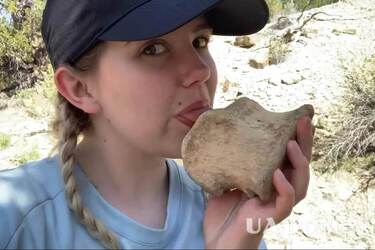All for the sake of science: Why geologists and palaeontologists lick rocks

There are many ways to conduct scientific research, but licking rocks may seem strange. However, this approach is an effective tool for geologists and palaeontologists in their search for valuable information about rocks and fossilised bones.
Read also: 30 ancient tombs belonging to the highest clergy found in Turkey
Randall Irmis, a scientist at the Museum of Natural History in Utah (USA), says that licking rocks is a common practical method. This is not an indicator of hunger, but a tool for studying rocks and finding fossilised dinosaur bones, IFLScience writes.
In particular, licking a stone can reveal whether it is a fossilised bone. If the stone has a fossil, it sticks to the tongue due to certain features. But this method is not limited to fossilised bones. Geologists can distinguish between different rock materials by rubbing the stone between their teeth. Clays soften, and sand leaves a mark.
Irmis emphasises that this is not the most pleasant part of the job, and sometimes they even joke with each other by tasting fossilised faeces to determine their origin. He points out that such actions are associated with working in a field that deals with materials that have existed for millions of years, and this is important for scientific discoveries.
As a reminder, British scientists have restored an ancient gate dating back 2,000 years, which was called the door to Britain.
If you want to get the latest news about the war and events in Ukraine, subscribe to our Telegram channel!
